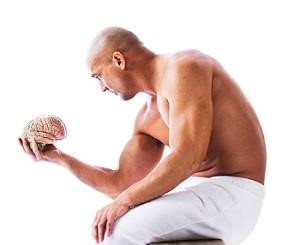Exercise enhances brain function. So it makes you smarter, right? Well…
“Exercise doesn’t make you smarter…it just makes you normal.” This great quote from John Medina in Brain Rules illustrates the essential role that physical activity plays in maintaining a minimally sharp mind.
Your brain is best at solving problems related to surviving in an unstable environment, and to do so in nearly constant motion. This is what the brain did for virtually all of human history until we engineered the need for physical activity out of everyday life.
[BEGIN Minor Brain Science Detour]
Exercise literally increases the blood volume in a region of the brain called the dentate gyrus, a vital part of the hippocampus. Exercise also stimulates BDNF, a protein which exerts a fertilizer-like growth effect on certain neurons. This protein keeps existing neurons young and healthy, rendering them much more willing to connect with one another. It also encourages neurogenesis, the formation of new cells in the brain. The cells most sensitive to this are in the hippocampus, inside the very regions deeply involved to human cognition and memory.
It’s what happens after exercise that optimizes the brain. Exercise increases levels of IGF-1 (a growth hormone), and in the hippocampus IGF-1 increases neuroplasticity (the way we learn associations with things), and neurogenesis. It’s another way exercise helps our neurons bind.
[END Minor Brain Science Detour]
“The way exercise changes our brains is more effective than wine, medicines, and doughnuts,” says John Ratey, author of Spark. But too often, those items are what we use to manage stress.
Excess Stress, lack of exercise, and junk food harms your brain. Stressed brains don’t learn the same way. The hormones released in response to stress are meant for immediate danger response, not chronic stress. Chronic stress makes adrenaline scar blood vessels while cortisol damages the cells of the hippocampus. (Whoops, another brief brain science detour. Sorry.)
Since exercise influences metabolism, it serves as a powerful way to influence synaptic function, and thus the way we think and feel.
As hard as it might be right now if you are in a highly stressful period of your life, instead of wine (yes, instead of wine), medicine, and doughnuts, what might be best to deal with stress is to get moving. Even if it’s just taking a short walk. The more you move, the better you’ll feel.
Your movement choices are not limited to exercise or nothing.
Even better if you make your movement playful. Take a tennis ball and bounce it around on that walk. Kick pebbles as you go along. Dodge the cracks. Step on the cracks. Balance on the curb.
No matter how sharp or smart you are, your brain gets better with physical activity. It has a 100% effectiveness rate and the side effects are a healthier body as well!

